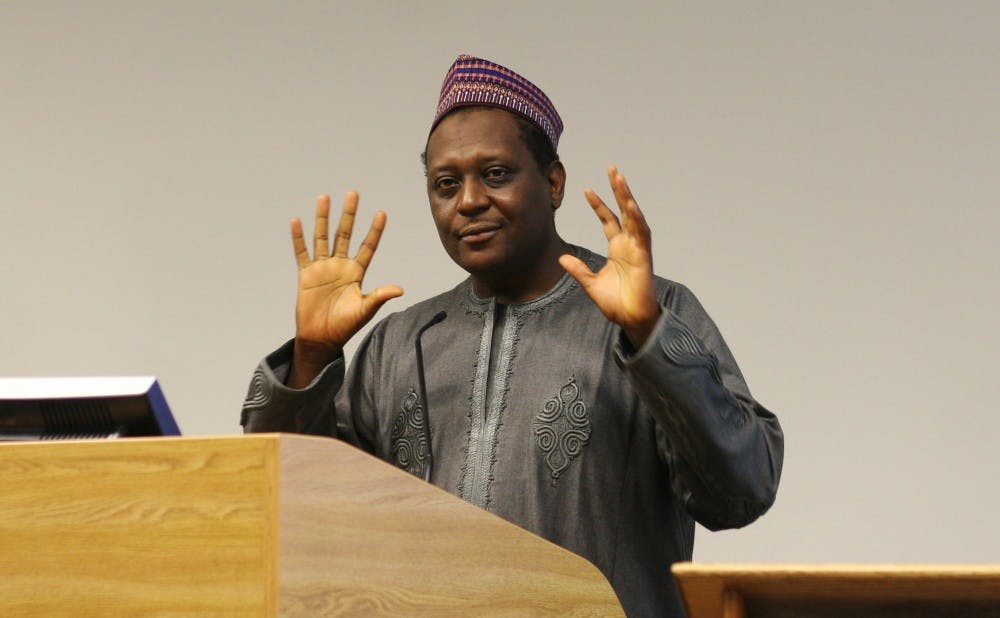Visiting scholar Dr. Muhammad Pate, Fuqua '06 and the former Nigerian Minister of State for Heath, will co-teach the graduate course “Health Systems in Developing Countries” next semester. Additionally, he will serve as a mentor to undergraduates in the new global health major, as well as contributing to the University-wide Africa Initiative. The Chronicle’s Lucy Hicks talked to Pate about his work and plans for next semester.
The Chronicle: What made you want to come back to teach at Duke?
Muhammad Pate: I had a great education when I was at Fuqua, and the health sector program that I had was very helpful in my career as chief executive officer and minister of health in Nigeria. [Now], several years later after my work experience and undergoing a transition in my career, it is great to have the platform that the Global Health Institute has provided to now reflect on those experiences that I have had since leaving Duke, but also to share what I have learned and to learn new things, which I am sure I will while working at the Global Health Institute. I have to say that in the past few years, Duke has experienced unprecedented levels of development in terms of global efforts…so the positioning of Duke on the global scale gives me that platform to reflect, learn and share what I have learned as well. I am very pleased to have that opportunity.
TC: Can you talk a little about the Africa Initiative at Duke and how it fits in with your previous work as the Nigerian Minister of State for Health and primary health care implementation in Africa?
MP: I think it’s a great part of Duke to actually have an initiative focused on Africa. I think for far too long Duke did not really have any students from Africa. There are students throughout the years and lots of faculty from Africa, but in terms of collaborations, I think [the University] has not maximally exploited the opportunities to participate on the continent of Africa...yet, there is a lot of transformation going on, both in terms of learning, research, and service, which show that there are opportunities where what Duke has to offer would be invaluable. So, I think the initiative is something that is long overdue, but I am very delighted that Duke has picked it up and is starting to engage in that fully. While I’m here, I look forward to doing my part to contribute.
TC: Is the Africa Initiative multi-departmental?
MP: One of the attractions of the Global Health Institute itself is its multi-disciplinary nature. It doesn’t just fit in only public health or just the business. It has really different sectors, which are more reflective of the reality in terms of what is needed to develop. It also creates an opportunity [for] innovation between different sectors. And so if the Africa initiative itself follows that model whereby it is cross-disciplinary, I think it will in the long run be able to make a huge impact.
TC: I understand you have done a lot of work with polio vaccines in Nigeria. Have you seen any improvements on that front?
MP: In the last 10 years, Nigeria has had a very difficult history, but over the last five years we have been able to make tremendous progress. For the first time, we interrupted the type 3 polio virus—this is the first time we have had a year without a single case of type 3 in Nigeria or in the world. With type 2 of polio eradicated and now type 3 interrupted, that only leaves type 1. So there is some evidence that it may be possible to eradicate polio over the next several years. This won’t be without any challenges, because all the parts of the worlds that had previously eradicated are becoming re-infected, like the whole of Africa and Syria. But having said that, the fact that the majority of the world has been able to keep [polio] away shows that even areas that have been reinfected can control it.
TC: What will your role in the "Health Systems in Developing Countries" course look like?
MP: In terms of putting together the course with Kevin Schulman, [we are] looking at structure in the course that would allow students to compare one system versus the other. These are global health students who will have a career, hopefully, in global health or related areas. And so the understanding that most health systems are mixed—they are not only public, but public as well as private. That interface between the public and private has not been explored as much as I think it should have been. So the opportunity to construct a course as to develop course material around this will be very interesting for me, even though I am new in this environment. But I also believe from what I hear about students...that they are very enthusiastic and I believe that we will foster a classroom will encourage learning from students as well as our own experiences. I believe it will be a very good class and I look forward to it.
TC: I also understand you will be a mentor for the new global health major. Do you know what your role will look like?
MP: Mentorship is something that is necessary. There are two sides to it: the mentor and mentee. So I am able, when necessary, to help students as they navigate their way around their studies here at Duke and what they want to do in the future.
Get The Chronicle straight to your inbox
Signup for our weekly newsletter. Cancel at any time.

